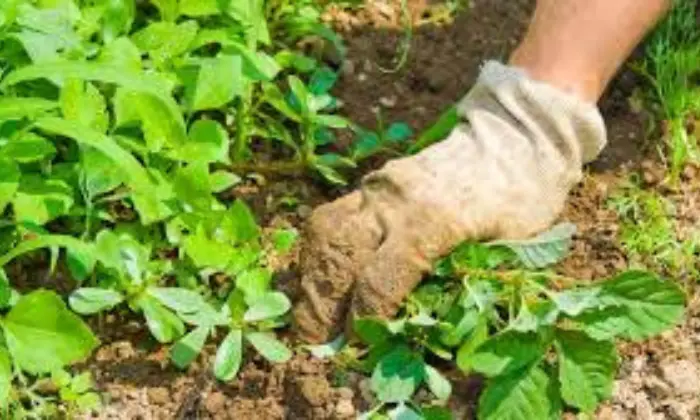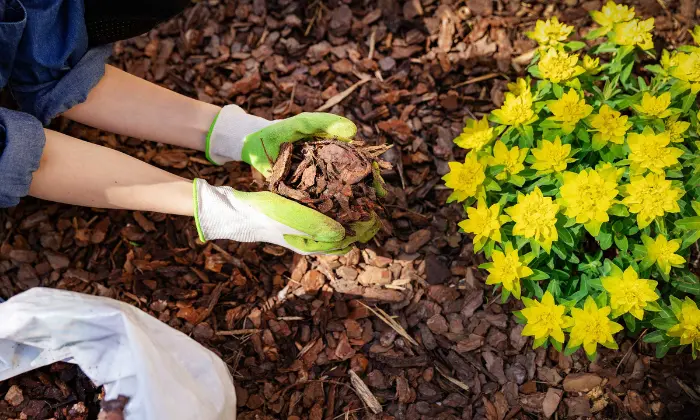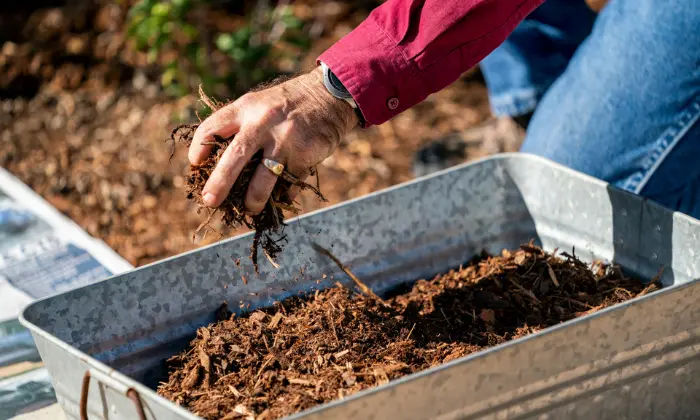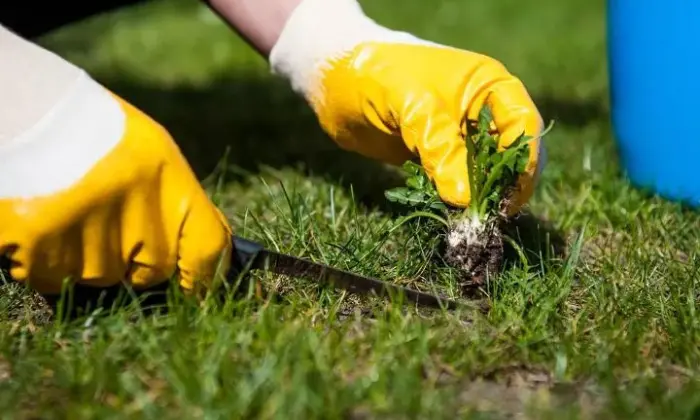Best Mulch to Prevent Weeds are the relentless invaders of our gardens, disrupting the beauty and balance we strive to cultivate. While we can’t eliminate them, we can certainly curb their growth with the right strategies. One effective method is using mulch. However, not all mulches are created equal when it comes to weed prevention. Let’s delve into the realm of gardening wisdom and explore the best mulches to combat those pesky weeds, with a touch of Robert’s Complete Care.
Understanding Weeds

Weeds growing through mulch where they are not wanted and compete with cultivated plants for essential resources such as space, light, nutrients, and water. To effectively manage your garden mulch, it’s essential to grasp the intricacies of weeds. Frequently seen as unwanted gatecrashers, weeds represent a huge test by contending with developed plants for indispensable assets like space, light, supplements, and water. Developing a successful weed control plan necessitates a deeper understanding of these botanical adversaries.
Varieties of Weeds
In this section, we’ll explore that does a bark mulch prevents weeds, In the Defined categories and delve into their growth cycles, empowering you to make informed decisions about weed prevention through mulching.
Annuals: These weeds complete their life cycle within a single growing season, producing seeds that may lie dormant in the soil and germinate in subsequent years. Examples include crabgrass and chickweed.
Biennials: Biennial weeds have a two-year life cycle. They grow vegetatively in the first year, flowering, producing seeds, and ultimately perishing in the second year. Common examples include burdock and wild carrot.
Perennials: Perennial weeds persist for several years and can regenerate from seeds or vegetative structures such as roots, rhizomes, or stolons. Dandelions and thistles are typical examples.
Weed Growth Cycle
Understanding the development pattern of weeds outfits nursery workers with the information required for viable control. Weeds typically progress through the following stages:
Germination: Weed seeds in the soil absorb water and nutrients, initiating the germination process. Seedlings eventually emerge from the soil and commence growth.
Vegetative growth: During this phase, weeds develop leaves, stems, and roots. Some species spread aggressively through rhizomes or other vegetative structures.
Reproductive growth: Weeds enter the reproductive phase when they begin producing flowers and seeds. Seed production frequency and volume vary among species.
Seed dispersal and dormancy: Mature weed seeds are dispersed through various means such as wind, water, animals, or human activity. Many weed seeds can remain dormant in the soil for years before germinating.
What is Mulch

Mulch acts as a protective layer in your garden, offering numerous benefits. Applied to the soil surface, it conserves moisture, acts as a natural barrier against weed growth, and enhances the aesthetic appeal of your outdoor space. The versatility of mulch is evident in the variety of materials it can be made from, including both organic and inorganic options. Choosing which mulch is better at the right lowes mulch allows you to nurture your plants while creating an attractive garden environment.
Benefits of Mulch
Moisture conservation: Mulch reduces evaporation, promoting healthier plant growth and reducing the need for additional watering.
- Weed suppression: Mulch blocks sunlight from reaching the soil, inhibiting weed germination and growth.
- Temperature regulation: Acting as an insulator, mulch helps regulate soil temperature and protect plant roots from extreme temperatures.
- Enhanced aesthetics: Mulch enhances the visual appeal of your garden or landscape.
Types of Mulch
1:Organic mulch: Derived from plant or animal materials. Common types include:
- Bark Mulch: Bark Mulch Provides a natural look and decomposes slowly, enriching the soil.
- Straw and grass clippings: Budget-friendly and nutrient-rich options that decompose quickly.
- Compost: Rich in nutrients, improving soil health and fertility.
2: Inorganic mulch: Made from non-living materials. Common types include:
- Stone and rock: Sturdy and low-support choices that hold soil dampness and stifle weed development.
- Rubber mulch: Long-lasting and eco-friendly, repelling pests and retaining soil moisture.
- Plastic and fabric: Serve as effective weed barriers while retaining soil moisture, though they may lack the visual appeal of organic options.
Mulching Guidelines for Weed Control
Timing: Apply mulch in spring or fall for optimal results. Choosing the Right Mulch: Select mulch based on plant needs and local conditions.
Preparation: Prepare the garden area by removing weeds and debris.
Application: Apply a thick layer of mulch with weed killer evenly across the garden bed.
Maintenance: Replenish as needed to maintain effectiveness in weed prevention and moisture retention. By adhering to these guidelines, you can effectively control weeds in your garden, promoting healthy plant growth and enhancing the beauty of your outdoor space.
What is the Best Mulch to Prevent Weeds?

Mulch serves as a protective barrier, blocking sunlight and hindering weed germination and growth. However, choosing the right mulch is crucial for optimal weed prevention. Here are some contenders for the title of the best mulch for thwarting weeds:
Organic Mulches
Organic mulches, derived from natural materials, offer excellent weed suppression while enriching the soil as it decomposes. Examples include:
- Straw: Straw mulch not only inhibits weed growth but also retains moisture, making it a valuable addition to garden beds. Its light colour reflects sunlight, further deterring weed growth.
- Wood Chips: Derived from various tree species, wood chips form a durable barrier against weeds. However, they decompose slowly, necessitating periodic replenishment.
- Shredded Leaves: Leaves, when shredded, create a dense mulch layer that effectively smothers weeds. As they break down, they enhance soil structure and fertility.
Inorganic Mulches
Inorganic mulches, though lacking the soil-nourishing properties of organic mulches, excel in weed suppression and longevity. Common options include:
- Gravel: Gravel mulch provides long-lasting weed control and aids in drainage. Opt for pea gravel or crushed stone for better aesthetics and easier maintenance.
- Black Plastic: Black plastic mulch acts as a formidable barrier against weeds by depriving them of light. It’s particularly effective in vegetable gardens, where rows can be easily covered and maintained.
- Landscape Fabric: Landscape fabric inhibits weed growth while allowing water and nutrients to penetrate the soil. It’s a popular choice for ornamental beds and landscaping projects.
Best Mulch to Prevent Weeds and Bugs

In addition to thwarting weeds, many gardeners seek mulches that deter pests and insects. While no mulch can entirely eradicate pests, certain options can help minimize their presence:
Cedar Mulch: Cedar mulch, derived from aromatic cedar trees, releases natural oils that repel insects like ants, termites, and moths. Its pleasant aroma adds a refreshing fragrance to the garden while providing effective weed suppression.
Cypress Mulch: Similar to cedar mulch, cypress mulch contains natural compounds that deter insects and pests. It’s particularly effective in repelling termites and cockroaches, making it a popular choice for landscaping around Home Depot mulch and structures.
Rubber Mulch: Made from recycled rubber tires, rubber mulch offers a unique blend of weed suppression and pest resistance. Its dense composition deters insects and rodents while providing long-lasting durability. However, some gardeners express concerns about its environmental impact and potential chemical leaching.
Conclusion
In conclusion, when seeking the best mulch to prevent weeds, look no further than Robert’s Complete Care. With its selection of organic mulches such as shredded bark, wood chips, and straw, Robert’s Complete Care provides a reliable solution for maintaining weed-free gardens and landscapes. By effectively blocking sunlight and enriching the soil with nutrients, these mulches not only suppress weed growth but also promote the health and vitality of your plants. Trust Robert’s Complete Care to keep your outdoor spaces thriving and weed-free year-round. Contact Us Today for all your gardening needs
FAQS
Why Is Mulching Important For Weed Prevention?
Mulching creates a protective barrier over the soil, blocking sunlight and inhibiting weed germination and growth. It also helps retain moisture, which further suppresses weed growth.
How Do Organic Mulches Prevent Weeds?
Organic mulches like shredded bark, wood chips, and straw create a dense layer over the soil, depriving weeds of sunlight necessary for growth. As they decompose, organic mulches also enrich the soil with nutrients, promoting healthier plant growth.
What Are Some Common Types Of Inorganic Mulches?
Inorganic mulches include materials like gravel, landscape fabric, and plastic. These materials effectively suppress weeds by blocking sunlight and inhibiting weed growth without decomposing like organic mulches.
When Is The Best Time To Apply Mulch For Weed Prevention?
Mulch should ideally be applied in spring or fall for optimal weed prevention. This timing allows for effective suppression of weed growth during the growing season.
How Thick Should Mulch Be Applied For Weed Prevention?
For effective weed prevention, apply mulch in a layer that is around 2-4 inches thick. Thicker layers may inhibit water and air penetration, while thinner layers may not provide adequate weed suppression.


